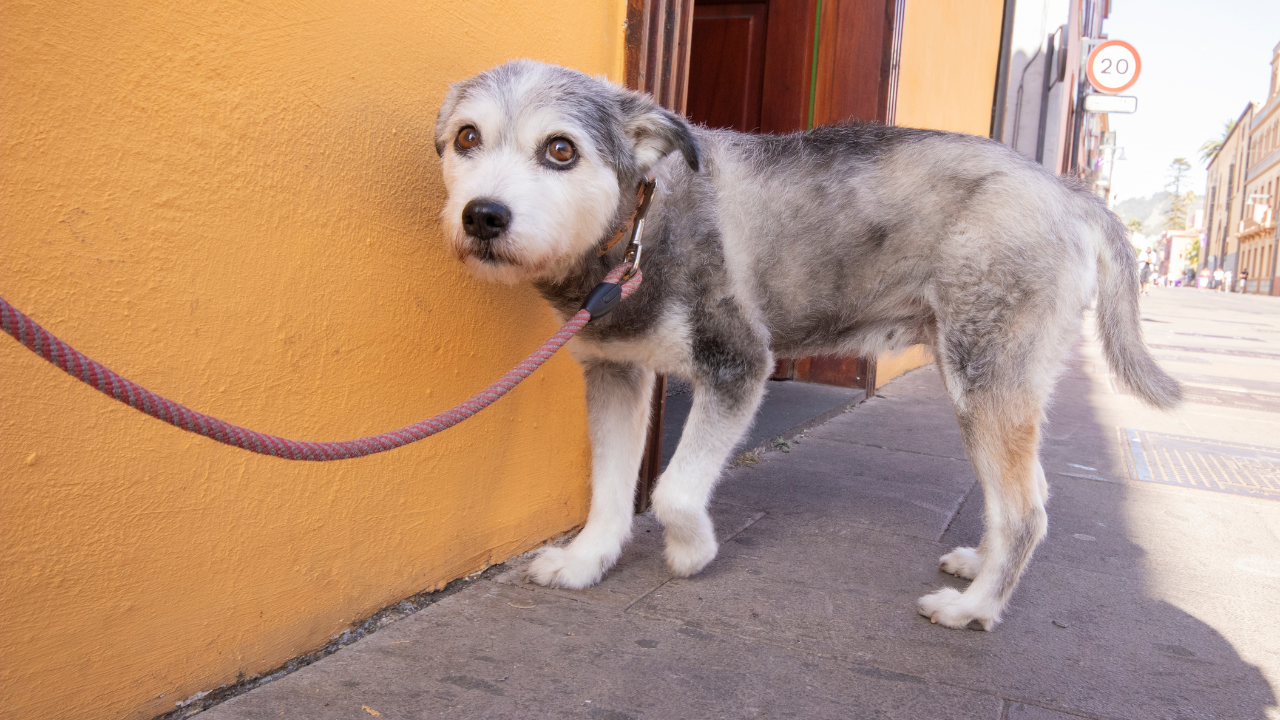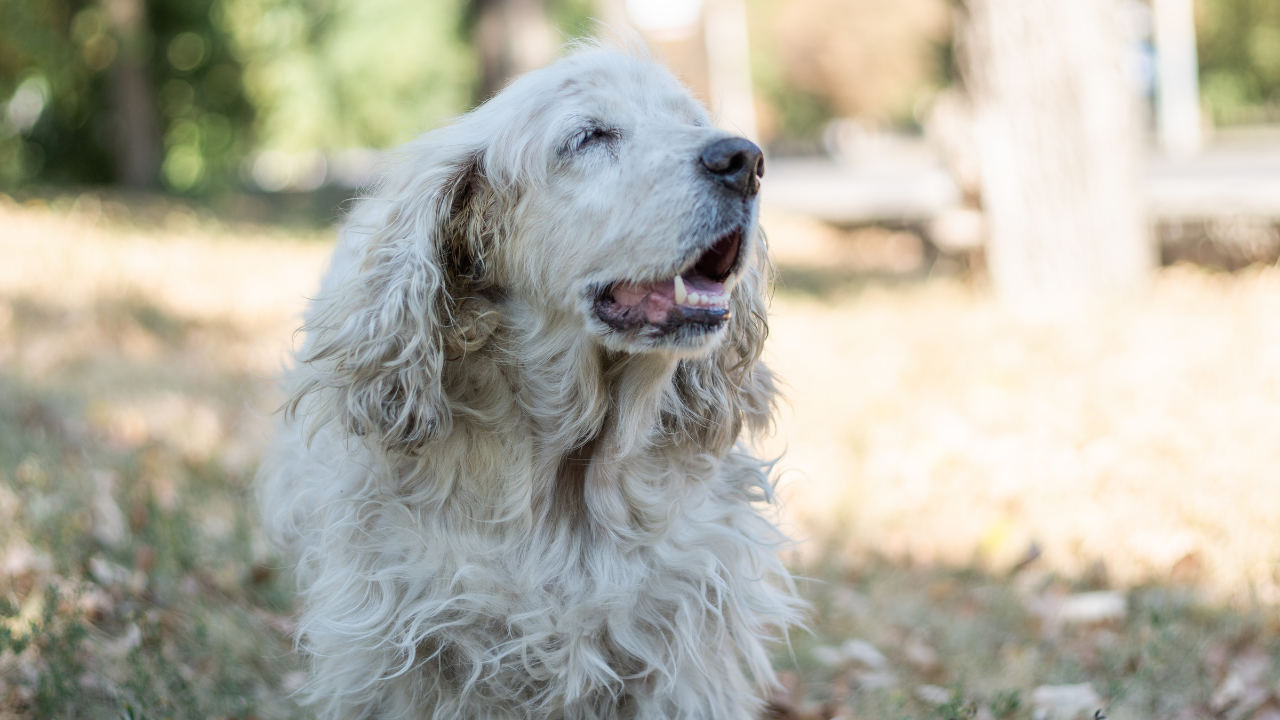My dog is shaking: causes and measures
Your dog suddenly starts shaking even though it's warm and there's no obvious reason. But why do dogs actually shake? This can understandably worry you, especially if the shaking lasts longer or occurs regularly. In this guide, you'll learn the main causes of shaking in dogs, what you can do, and when it's time to see the vet.
Trembling in dogs – Why dogs tremble!
Trembling in dogs is a common phenomenon that can occur for a variety of reasons. It is important that you observe the various indicators to better assess whether it is a harmless condition or a more serious problem. When a dog trembles, it can be due to simple causes such as cold or stress, but it can also indicate health problems.
To ensure the well-being of your dog, you as a dog owner should get an overview of the possible causes and reasons why a dog shakes.
Cold as a cause of shivering in dogs
A common and often harmless scenario is shivering from the cold in four-legged friends. Dogs, especially small breeds or those with short fur, can quickly become cold in low temperatures. Shivering is a natural reaction of the body to generate heat and maintain body temperature. Be careful not to leave your dog outside for too long in cold weather conditions and use a dog coat if necessary.
Measures in cold weather:
-
Limit the time your dog spends outside.
-
Make sure your dog has a warm area indoors.
-
Use a dog coat or blanket to keep him warm.
Trembling in dogs due to fear and stress
Dogs are very sensitive creatures and can react strongly to stress and fear. A dog's shaking is a typical reaction in such situations. Possible triggers are loud noises such as fireworks or thunderstorms, but also unfamiliar environments such as a visit to the vet, which can trigger fear. By shaking, your dog shows that he is feeling unwell and possibly afraid. It is important to stay calm and give your dog security.
Measures for anxiety or stress:
-
Stay calm and relaxed to give your dog a sense of security.
-
Avoid noisy or stressful environments.
-
Offer him a place to retreat to where he feels safe.

Trembling in dogs as a sign of pain
Another reason for shaking in dogs can be pain. Older dogs in particular, who suffer from joint problems or arthritis, often show shaking in connection with a lack of movement or stiffness. Shaking can also occur in the case of injuries or acute pain caused by internal diseases. If you suspect that your dog is in pain, you should visit the vet to determine the cause.
Indicators that indicate pain:
-
Tremors associated with lameness or restricted movement.
-
Changes in behavior, such as decreased appetite or withdrawal.
-
Hypersensitivity to touching certain areas of the body.
Diseases as a cause of tremors
Diseases such as the so-called "shaking syndrome", neurological disorders or infections can also cause tremors in dogs. When there is a fever, the body tries to regulate body temperature by shaking. Epilepsy can also lead to convulsive twitching or tremors. It is important to distinguish this type of tremor from other forms and to seek medical help in a timely manner.
Measures in case of suspected illness:
-
Watch for other indicators such as vomiting, diarrhea or fever.
-
If your dog has neurological disorders, you should have him thoroughly examined.
-
Make note of the frequency and duration of the tremors to give your veterinarian detailed information.
Poisoning as a cause of tremors
Dogs are curious and like to try things they shouldn't. Poisoning, such as from eating chocolate, poisonous plants or household cleaners, can lead to tremors, vomiting and convulsions. If you suspect that your dog has ingested something poisonous, you should contact your vet immediately.
First aid in case of suspected poisoning:
-
Take your dog to the vet immediately.
-
Try to find out what he has eaten to give the doctor accurate information.
-
Keep your dog calm and prevent further ingestion of the toxic substance.
Tremors in dogs due to hypoglycemia
Small dog breeds or puppies in particular tend to shake when their blood sugar levels are low. This often happens when the dog has eaten too little or has been physically active. In such a case, it helps to give your dog something to eat quickly to stabilize the blood sugar level.
Measures for hypoglycemia:
-
Feed small, regular meals to keep blood sugar levels stable.
-
If your pet is shaking acutely, you can give it a piece of sugary food or honey.
-
Make sure puppies get enough nutrients.
aging processes and tremors
An old dog often trembles due to age-related diseases such as arthritis or neurological problems. The tremors can be caused by muscle loss or limited mobility. Here too, a visit to the vet is advisable to clarify whether your dog is in pain or whether physiotherapy measures could help.
Measures for older dogs:
-
Provide your dog with comfortable places to sleep and make sure he does not overexert himself.
-
Talk to your doctor about whether painkillers or supplements might help.
-
Regular exercise and physical therapy can relieve joint problems.

Trembling due to excitement and anticipation
Some dogs tremble when they are excited, for example when they know they are about to go for a walk or eat. This trembling is usually harmless and stops once the dog has calmed down. It is important that you make sure that the dog is not in a permanent state of over-excitement, as this can lead to stress in the long term.
Measures in case of excitement:
-
Try to calm your dog down during stressful moments.
-
Train specifically during rest periods to avoid overstimulation.
-
Give him clear signals when it is time to relax.

Tremors caused by gastrointestinal problems
Trembling can also be a sign of gastrointestinal problems, especially if it occurs in conjunction with vomiting or diarrhea. In such cases, your dog may be feeling uncomfortable in the abdominal area. During this time, feed him only easily digestible food and consult a veterinarian if symptoms persist.
Treatment for gastrointestinal problems:
-
Give your dog bland food like rice and chicken.
-
Make sure he drinks enough water to avoid dehydration.
-
Consult your veterinarian if the condition does not improve.
Tremors due to tiredness or exhaustion
Dogs sometimes tremble when they are very tired or exhausted, especially after long walks or intense play sessions. The trembling in such cases is the body's reaction to overexertion. It usually stops after a short period of rest.
Procedure for exhaustion:
-
Make sure your dog gets enough rest.
-
Avoid overexertion, especially with puppies or older dogs.
-
Make sure to take regular breaks during longer activities.

muscle tremors after exercise
Muscle tremors can occur after intense physical activity, such as a long run or workout. This is similar to the muscle tremors that people experience after strenuous exercise. It is usually harmless as long as it is temporary.
Measures for muscle tremors:
-
Give your dog enough time to recover after exercise.
-
Avoid excessive physical exertion, especially in untrained dogs.
-
Make sure your dog drinks enough after exercise.
Tremors in Neurological Disorders
Certain neurological disorders such as the aforementioned "shaking syndrome" or epilepsy can cause tremors or twitching. These conditions require accurate diagnosis and treatment by a veterinarian, as they can cause serious health problems if left untreated.
Approach to neurological disorders:
-
Watch for unusual behavior such as sudden convulsions or disorientation.
-
Record the indicators carefully and discuss them with your veterinarian.
-
In some cases, medication may be necessary.
Tremors due to pain after surgery
After surgery, tremors can be caused by pain or the side effects of anesthesia. In these cases, you should give your dog plenty of rest and give him painkillers.
Aids after operations:
-
Give your dog the prescribed pain medication and ensure he recovers.
-
Keep him still and avoid unnecessary movement.
-
Consult your veterinarian if the tremors persist.
Fever as a trigger for tremors
If your dog has a fever, he may shiver as the body tries to regulate its temperature. Accompanying symptoms such as loss of appetite, lethargy and vomiting may indicate a serious infection. In this case, an immediate visit to the vet is advisable.
Treatment for fever:
-
Take your dog's temperature to make sure he has a fever.
-
Provide him with plenty of water to avoid dehydration.
-
Take him to the doctor immediately to treat the cause of the fever.
Tremors due to overheating
Overheating can also cause shivering. If a dog has been in the sun for too long or has exerted itself too much, its body can overheat. In such cases, it is important to cool the dog down immediately, as overheating can be life-threatening.
Measures in case of overheating:
-
Immediately take your dog into the shade or a cool room.
-
Offer him fresh water and cool him down gently with wet towels.
-
If his condition does not improve quickly, contact your veterinarian.
Tremors after vaccinations
Some dogs react to vaccinations with tremors, which may be due to side effects or pain at the injection site. These symptoms are usually temporary and disappear within a few hours.
Behavior after vaccinations:
-
Give your dog time to recover from the vaccination.
-
If the shaking continues or other symptoms such as vomiting occur, contact your veterinarian.
-
Watch your dog closely for unusual reactions.
Tremors caused by hormonal disorders
Hormonal imbalances, such as an underactive thyroid (hypothyroidism), can also cause tremors. If you suspect a hormonal disorder, you should have your veterinarian do a blood test to determine this.
Measures for hormonal disorders:
-
Watch for additional symptoms such as weight gain or lack of motivation.
-
Discuss possible medication treatment.
-
Regular check-ups and blood tests are important to monitor the condition.
Trembling in Puppies
Puppies often shiver, especially in the first few weeks after birth. This can be caused by hypothermia, hypoglycemia, or a lack of control over their bodily functions. Puppies often do not have fully developed thermoregulation and shiver to warm themselves up.
Measures for shaking puppies:
-
Make sure your puppy is always warm enough.
-
Feed him regularly to avoid hypoglycemia.
-
Observe his behavior and contact your veterinarian if you are unsure.
Tremors in Small Dog Breeds
Small dog breeds, such as Chihuahuas or Miniature Pinschers, often shiver more often than larger dogs. This is partly because they are more sensitive to temperature changes and get cold more quickly. Stress and excitement can also cause shivering in these breeds.
Measures for small dogs:
-
Make sure your dog is warm enough, especially during cold months.
-
Avoid stressful situations and create a relaxed environment.

Trembling after bathing
Dogs often shiver after bathing, especially if they are not completely dry. This is also a natural reaction to the cold, especially in dogs with thin fur.
Measures after bathing:
-
Dry your dog thoroughly to minimize shaking.
-
Use a hair dryer on a low setting to dry it quickly and safely.
-
Make sure it does not get into cold environments until it is completely dry.

Tremors in infections and inflammations
Infections, whether caused by viruses, bacteria or parasites, can cause tremors. This type of tremor is often accompanied by other symptoms such as fever, vomiting or loss of appetite. Quick action is required to find and treat the cause.
Measures in case of infections:
-
Watch for symptoms such as fever, chills, or lethargy.
-
Take your dog to the vet immediately to rule out infection.
-
Keep your dog calm and make sure he drinks plenty of fluids.
Dog trembles in sleep
If your four-legged friend shakes in his sleep, it may seem strange or even worrying at first. But shaking during sleep is completely normal and harmless in most cases. Just like people, dogs go through different phases of sleep, including the so-called REM phase (Rapid Eye Movement), which is considered a dream phase. During this phase, twitching or shaking may occur because the dog is dreaming.
Measures for tremors during sleep:
-
Observe: In most cases, your dog is shaking in his sleep because he is dreaming. Watch him from a distance and let him sleep.
-
Quiet surroundings: Make sure your dog's sleeping area is quiet and comfortable so he can sleep undisturbed.
-
Visit to the vet if abnormalities occur: If the shaking is excessive or your dog seems confused when he wakes up, talk to your veterinarian to rule out serious health problems.
When should you go to the vet?
Not every case of shaking in a dog requires an immediate visit to the doctor, but there are certain signs that you should be cautious about. If the shaking lasts longer than usual or is accompanied by other symptoms such as vomiting, diarrhea, lethargy or pain, a visit to the vet is essential.
Indications for a visit to the veterinarian:
-
Your dog is shaking violently and showing other worrying symptoms.
-
The tremor lasts longer than a few minutes or occurs frequently.
-
There is a suspicion of poisoning or a serious illness.
Conclusion
There are many reasons why dogs may shiver, from harmless factors such as cold to serious health problems. It is important that you observe your dog's symptoms closely and act quickly if necessary. Depending on the situation, if in doubt, a visit to the vet is always the right decision to ensure the health of your four-legged friend.






